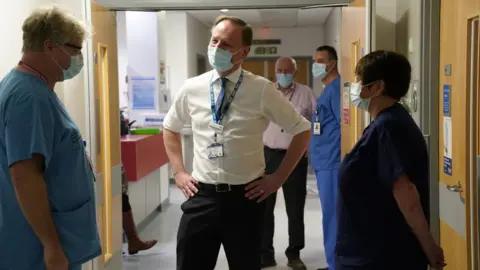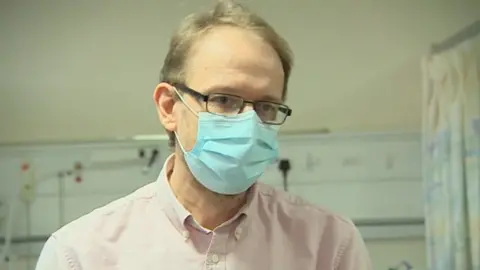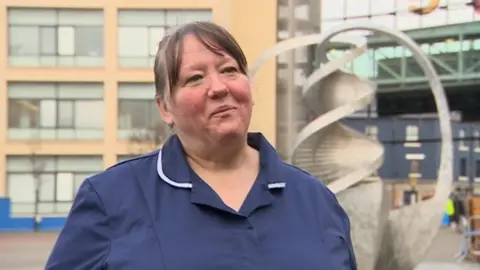Covid: NHS chief thanks NHS on anniversary of first cases
 PA Media
PA MediaThe anniversary of the UK's first Covid cases is an "appropriate" time for people to thank all NHS workers, the head of the health service has said.
NHS England chief executive Sir Simon Stevens praised treatment innovations on a visit to Newcastle's Royal Victoria Infirmary (RVI) on Friday.
The hospital treated the UK's first two Covid-19 patients a year ago.
The pair, a Chinese student and his mother, were in York when they fell ill with the virus.
Sir Simon said: "These are the staff here at this hospital in Newcastle who treated the first coronavirus patients in England a year ago.
"Since then, hospitals across the country have looked after more than 300,000 severely ill coronavirus patients so I do think, on this one year anniversary, it is appropriate for the whole country to say a huge thank you to every member of staff across the health service.
"There has also been huge innovation and improvements in treatments on offer and now, of course, vaccines."

The emergence of coronavirus in Wuhan, China, led the UK to declare a level four incident, the highest state of alert, on 30 January last year.
That night, the pair from York were brought to the RVI's specialist High Consequence Infectious Disease (HCID) unit.
Consultant in infectious diseases Dr Ashley Price said initially they did not understand the disease they were treating.
"When we had our first patient, we had no treatment for them," he said.
"There was nothing we could do apart from support them, give them oxygen and treat anything else that happened, like pneumonia."
Research staff were drafted in from other specialities to work on Covid treatments and prior planning for such an eventuality paid early dividends, he said.

Analysis
Sharon Barbour - BBC Look North health correspondent
It came as no surprise that the UK's first confirmed cases of coronavirus were being transported to the Royal Victoria Infirmary.
Hidden within the hospital is a highly specialised isolation unit for extremely contagious viruses. Suspected Ebola patients had previously been flown here from Sierra Leone and the team - who had been closely watching the news in China - had been preparing for this new, deadly and highly contagious virus.
On duty that night was senior sister Margaret Ward who took the call at four in the morning. Driving in, she wondered what she was about to face.
There had been a media blackout at the time and it was months before doctors told us about the patients; that they were relatively well and made a full recovery.
But this day marked the beginning of the UK's Covid story and, in the coming months, the early trickle turned into a flood of patients. Soon it was as if the infectious diseases unit took over the whole hospital - everyone was in PPE.
ITU was rapidly expanded and it has been able to take in Covid patients from not only across the region, but across England. The hospital has since treated more than 2,000 patients.
Newcastle has also been at the centre of research into treatments for Covid, long-Covid and vaccines and, since that night of 31 January 2020, so much more has been learned about managing the virus.

Dr Price said: "One of the things that we did, even before this pandemic, was to imagine what we would do if there was a pandemic.
"That helped us a little bit at the beginning."

One of the senior nurses now running the Centre for Life vaccination hub, Alison Heathcote, said the ward she normally works on was one of the first Covid wards.
"It was a really challenging and worrying time for everybody," she said.
"So, to get to this point and to have been involved with something that is hopefully going to have a major impact on moving us out of the pandemic it's really important to me."

- LOCKDOWN RULES: What are they and when will they end?
- SOCIAL DISTANCING: How can I meet my friend safely?
- SCHOOLS: When will they reopen?
- QUARANTINE: Will I need to self-isolate in a hotel?
- TREATMENTS: What progress are we making to help people?


Follow BBC North East & Cumbria on Twitter, Facebook and Instagram. Send your story ideas to [email protected].
